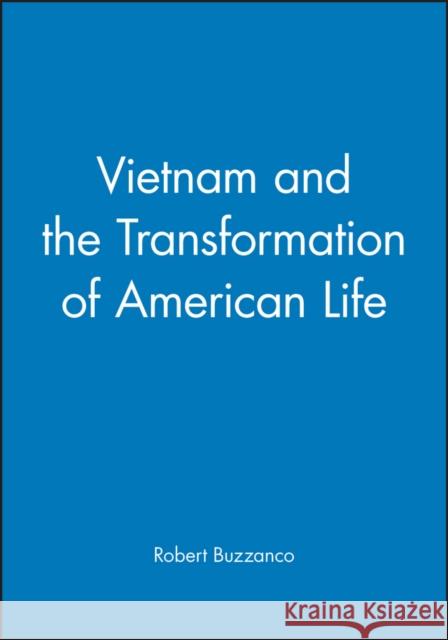


The Vietnam War, which dominated American life during the 1960s, helped to create, radicalize, and alter social and political life in the US.
"The Indochina wars have cast a long shadow over world affairs. For the victims, they were a devastating catastrophe. Their legacy for the United States was substantial, interacting in complex ways with internal developments in American society. Buzzanco′s study examines these themes with skill and insight, informed by outstanding scholarship and enriched by perceptive understanding." Noam Chomsky, Massachusetts Institute of Technology
Acknowledgements vi
Introduction: Intersection: The Vietnam War and the Social and Political Movements of the 1960s 1
Part I The Vietnam War
1 Containment, Liberalism, and Vietnam: Background to the American War 13
2 Why (Not) Vietnam? The Vietnamese, the French, and the Americans to 1960 22
3 Destroying the Country to Save It: The American War on Vietnam, 1960–1968 61
4 The Empire Strikes Back: The Vietnam War from 1968 to 1975 101
Part II The Movements of the 1960s
5 Many Deeds of War : Hope and Anguish in the 1960s 139
6 Love Me, I m a Liberal: The Politics of 1960s and Vietnam 150
7 The Struggles at Home: Civil Rights and Women s Liberation 191
8 One, Two, Three, What Are We Fightin For? Cultural Politics in the Vietnam Era 234
Notes 252
Bibliography 264
Index 270
Robert Buzzanco is Associate Professor of History at the University of Houston. He is the author of Masters of War: Military Dissent and Politics in the Vietnam Era (1996), which received the Stuart L. Bernath Prize for best book in diplomatic history in 1996. In 1998 he was named as outstanding young scholar in his field by the Society for Historians of American Foreign Relations.
In this concise and lively volume, award–winning author Robert Buzzanco examines the role America played in the Vietnam War and how the consequences of this involvement dramatically changed American politics, culture, and society at a period when the United States was most vulnerable.
Divided into two sections, Vietnam and the Transformation of American Life begins with a history of the emergence of Ho Chi Minh and the Vietnamese nationalist movement and explains why the United States intervened in Vietnam despite pessimism over American military prospects there. Buzzanco then traces the repeated escalations of the war in the Johnson and Nixon years, and, finally, the causes and consequences of American defeat. Part Two focuses on the major political and social movements of the 1960s: liberalism, civil rights, women′s liberation, student activist movements protesting the war, and other youth culture movements. The book demonstrates how domestic mobilization against the war changed US political and social life and these changes gave rise, in turn, to other movements and consequent changes of great significance to American society.
The Vietnam War, which dominated American life during the 1960s, helped to create, radicalize, and alter social and political life in the US. In Vietnam and the Transformation of American Life Robert Buzzanco generates fresh and intriguing insights that will inspire both students and general readers as they approach this dramatically divisive, volatile, and ultimately crucial period of American history.
1997-2026 DolnySlask.com Agencja Internetowa







